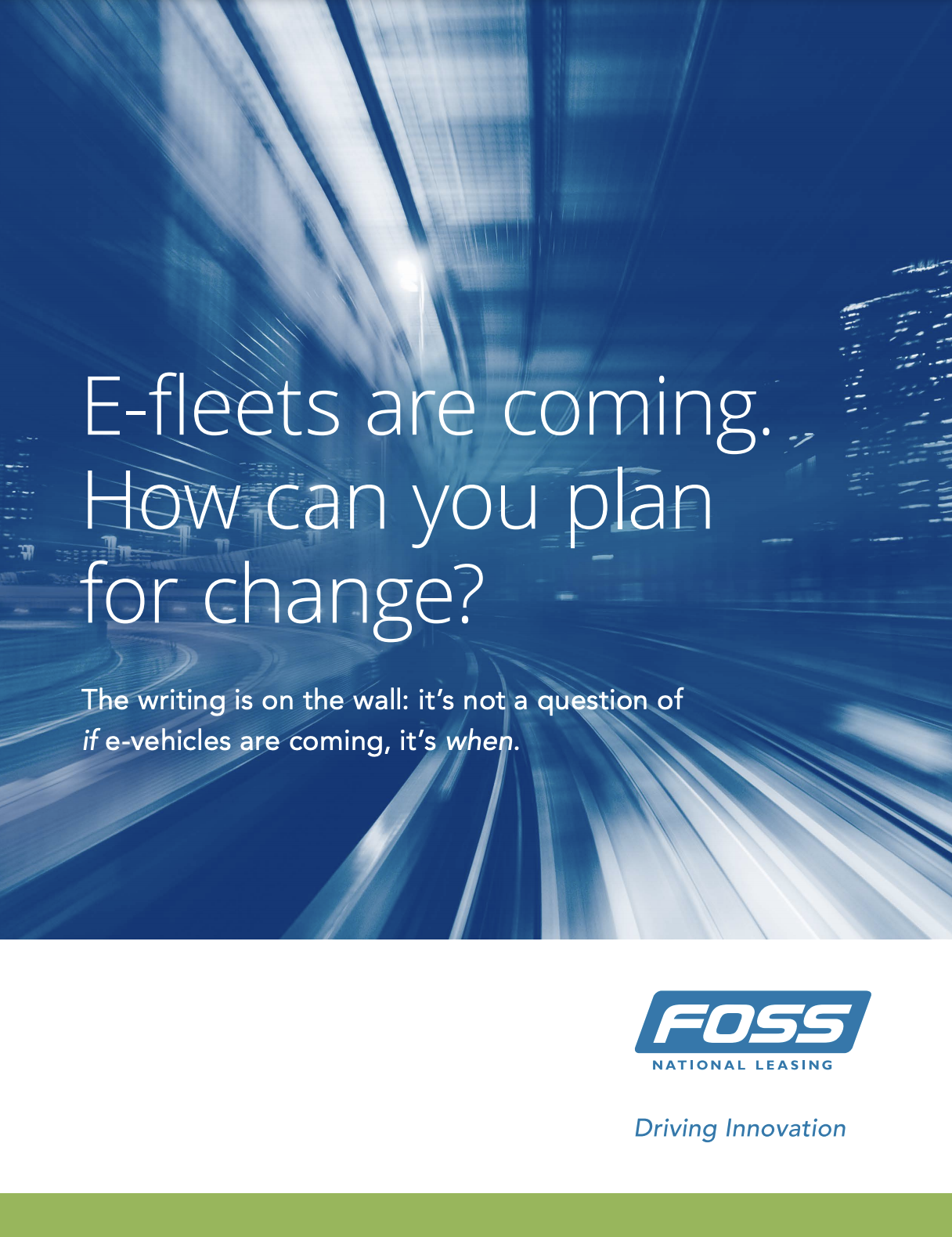%20and%20How%20Do%20You%20Plan%20Your%20Fleet%E2%80%99s%20Future/electric-vehicles-are-coming-feature.jpg)
Every year, more electric vehicles appear on our roads. Just a couple of years ago, there were only a handful of EV passenger cars on the market, and now there are dozens.
Major players, including Volkswagen and General Motors, are making massive investments and jockeying for a place in the future market. Now is the time for companies to begin thinking about the future.
In today’s blog, we’ll share some key information on what’s happening in the EV market today, and what you should be considering as you plan your eventual transition to an electric vehicle fleet.
Today’s Successful EVs Are Passenger Vehicles
With all the excitement over electric vehicles, some organizations are wondering if they should begin adopting them. But the reality is, the EV market can’t yet deliver on what most fleets require.
As light passenger vehicles, today’s EVs are viable for some fleet purposes—if you’ve considered daily driving distances, charging times, recharger locations, and the electrical requirements for installing charging stations. Plug-in hybrid electric vehicles (PHEVs) may also work well for some fleets.
But at the end of the day, today’s EVs are not built for work.
Fleets Need Fit-for-Purpose Vehicles: EV Manufacturers Are Answering the Call
The commercial fleet market is not like the consumer vehicle market. Fleet vehicles do deliveries. They bring workers to their job sites. They are often fit-for-purpose with customized built-in equipment. So any fleet EV must be able to do the job of a comparable gas or diesel-powered vehicle.
GM, Ford, and Rivian are examples of manufacturers that are currently designing EV vans, pickups, and light trucks. Currently, the only fully-electric truck available from Ford is the F-150 Lightning. Several models from GM are slated for release in 2023. Startup company, Rivian, now manufactures a van designed specifically for Amazon’s last mile deliveries.
See also: Canada Federal EV Incentives: 3 Key Benefits for Fleets
For Work Vehicles, ICEs Are Still the Practical Choice —For Now
For companies, now is the time to “wait and see”. Even though the first EV work vehicles are starting to appear, it may be wise to give them time. It may take years to measure any model’s reliability and durability, and calculate the true TCO. It will also take time for manufacturers to prove that their EVs are supported with a nationwide parts and service network to keep the vehicles on the road.
In short, internal combustion engine (ICE) trucks and vans are going to be around for a long time. We all have a lifetime of experience with them. We understand their payloads, costs, safety, reliability—and all the variables that are unknown about electric vehicles. An ICE-powered truck or van that is purchased this year will still be fit for its purpose for years, even as more viable electric models begin to appear on the market.
Read more: Green Fleet Management Strategies That Don't Require EVs
Considerations Around TCO Analyses for Electric Vehicles
A complete TCO analysis requires precise data—which, for electric work vehicles, is nonexistent at this point. That being said, here are some cost considerations to keep in mind:
- Higher initial cost of EVs (even with rebates).
- Lower fuel costs of EVs depending on local gas/diesel vs. electricity rates.
- Lower maintenance costs of EVs, due to the simplicity of the electric drivetrain. (But what if something goes wrong with the battery? Battery replacement costs are huge.)
- Longer vehicle life due to the simpler drivetrain. Some EVs have longer warranties of up to 8 years/160,000 km on electrical components, and some lease companies offer longer lease periods for EVs.
- Road and bridge tolls and other costs are minimized with “Green Plate” programs in Quebec and Ontario that provide privileged and reduced cost access to some HOV lanes, ferries, bridges, and toll roads.
- Unknown end-of-lease resale value. What will be the resale value of a vehicle with a 3-year-old battery and high mileage? No one knows. Will technology improve, making your EV truck obsolete in a few years? What will its “old” technology be worth at resale?
In summary, today, it’s impossible to do an accurate TCO comparison for EVs. Data is gradually appearing for passenger vehicles. But for work vehicles, it will take years to gather trustworthy data, and that data will be regional. Reliability and TCO may be different in milder vs. harsher climates, for example.
What to Know About EV Operating Range
Experience is showing that the range of EVs is often less than advertised. For work vehicles that operate with heavy loads, the operating range of battery-powered electric vehicles may be inadequate.
Oil patch trucks, for example, often need to travel long distances in remote locations between fueling stops. That’s beyond the range of any battery EV that is currently available.
Temperature is another consideration. Battery range drops as the temperature falls. For work vehicles in the Canadian winter, this could present problems.
Electric Vehicle Fleet Charging Considerations
Battery-powered EVs must be recharged, which means that you may need to install charging stations. If your fleet returns to one parking lot at night, you will need to provide enough workplace charging stations for the entire fleet—and ensure that the facility’s electrical grid can handle the load.
If your employees drive their cars home at night, you will need to install a home charger at each employee’s home. But there are some additional issues that arise in this scenario, such as:
- Who pays for the employee’s home charger?
- What if the employee’s building (or city block) can’t provide enough power to support a home charger?
- Who calculates and pays for the electricity consumed?
- What happens if the employee leaves the company?
None of these issues will necessarily be major roadblocks, but they could present challenges that need to be taken into account.
Learn more about fleet charging in this interview with a leading EV adoption specialist. %20and%20How%20Do%20You%20Plan%20Your%20Fleet%E2%80%99s%20Future/fleet-management.jpg?width=1500&name=fleet-management.jpg)
How to Begin Your Fleet Electrification Plan
Our advice for organizations is to keep an eye on the EV market as it relates to the vehicles your fleet needs. Things are changing every day. Keep in touch with your fleet management company: they are following trends closely and can help you make an informed decision on when to “go EV” and when to wait and see.
And remember: don’t simply look at what other fleets are doing. Their weight, weather, or distance requirements may be quite different from yours. No other business uses its fleet exactly like yours does, so you are the best to judge.
Finally, don’t just say “EVs will never work”. Vehicles and technology are evolving. Keep on top of the market, and when the time is right, don’t be afraid to give EVs a test. If, for example, you replace 50 trucks a year (of a fleet of 200), why not order five EV trucks (if they meet your requirements)? Follow their performance over time. Track their reliability and TCO. If things work out well, acquire a few more next year. Avoid an all or nothing mindset that may lead you to become paralyzed and afraid to make any changes at all.
Final Thoughts: Electric Vehicle Fleet Management Is the Future
It’s exciting to see the electric vehicle market continue to evolve, and it’s important for organizations to keep an eye on the changes that are occurring, even if you’re not ready to adopt EVs into your fleet yet. Your fleet management company is an invaluable resource to help you make the best decisions around fleet electrification, or even just provide information on market trends for you to consider.
At Foss National, we’re looking forward to what the next five-to-ten years will bring in terms of electric vehicles and other new vehicle technologies. Don’t hesitate to reach out to us if you’d like to have a discussion about it, or to learn more about our EV-specific fleet services.
Get to Know the Author
Ex-President
Jeff Hartley has served as President of Foss National Leasing from 2002 till 2024. Jeff has over 25 years experience in the financial industry. Prior to joining Foss National Leasing, Jeff was the President of Volvo Commercial Finance from 1997-2000 and was Vice President at GE Capital from 1987-1996. Jeff has also been involved in different scales of operations ranging from a start-up business to a $750 million asset organization.
Meet our team




%20and%20How%20Do%20You%20Plan%20Your%20Fleet%E2%80%99s%20Future/fleet-vehicles%20(1).jpg?width=1500&name=fleet-vehicles%20(1).jpg)
%20and%20How%20Do%20You%20Plan%20Your%20Fleet%E2%80%99s%20Future/electric-vehicles.jpg?width=1500&name=electric-vehicles.jpg)



